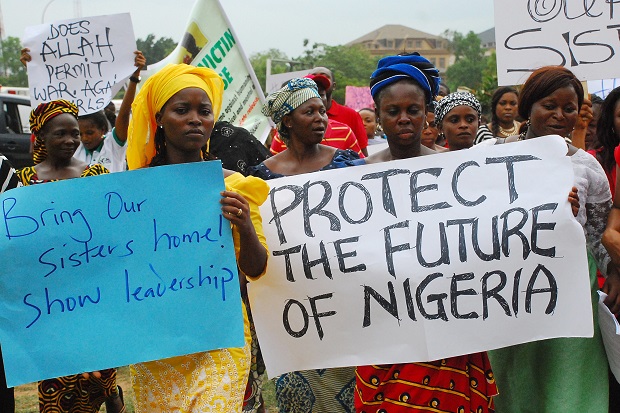You know, the more we hear about the uselessness of the Nigerian government in dealing with the abduction – the rape, in the original sense of the word – by Boko Haram of 230-odd schoolgirls, the less appealing that government appears. The most striking and urgent action it took in response to the crisis in the three weeks since it happened was yesterday to arrest Naomi Mutah Nyadar, one of the women behind the mass demonstrations calling on the unhappily named president, Goodluck Jonathan, to get a grip and do something. Apparently his wife Patience took against her because she spoke about rescuing “our daughters” when in fact she was not the mother of any of the victims; she was speaking metaphorically, you see. Mrs Jonathan views the whole thing as a damaging distraction from her husband’s re-election campaign, apparently.
If it weren’t so horrible in itself, this flagrant outrage by Boko Haram – whose leader helpfully explained that the reason the girls were kidnapped was because they had no business being at school; they should have been married by now – would serve as a useful illustration of the general corruption and incompetence of the Nigerian government: like government, like army. The country’s annual defence budget is about £3.5 billion yet the frontline soldiers unfortunate enough to be sent into the areas where Boko Haram hangs out are by all accounts drastically under-equipped by comparison with the surprisingly well-provided terrorists. The US has offered intelligence help, which is nice, but relatives claim that when they do offer actual information from people in contact with the girls, or the girls themselves in snatched mobile phone conversations, the security forces just don’t seem that interested.
But credit where it’s due. The Foreign Secretary, William Hague, was apparently on the Nigerian government’s case about 24 hours after the girls were taken, offering whatever help it needed to get them back. The government, funnily, didn’t take him up on it. And although it’s dandy that Mr Hague plans to bring up the issue at his forthcoming summit in London about women and violence in war, it leaves unanswered the question of what you do when the actual government in question is both useless and corrupt.
This wretched affair should make us think twice about economic relations with Nigeria itself. Not just the amount of UK aid that goes there – about £238 million a year, it seems, almost all of it to non-state agencies, which is controversial enough – but investment in Nigeria generally. Nigeria is of course the third bit of that fashionable acronym MINT – Mexico, Indonesia, Nigeria and Turkey – which has been vigorously promoted by investment buffs and popularised by Goldman Sachs’ Jim O’Neill as a supplement/alternative to the better known shorthand for exciting developing economies, the BRICs. When I first heard about MINT, in an astonishingly uncritical BBC business programme earlier this year, the first thing that occurred to me was that they were either anarchic or the kind of ghastly states that no investor with even a minimal sense of business ethics should touch with a bargepole. Mexico, with its unlovely record of gang warfare and terrifying homicide rate; Indonesia with its dodgy human rights record, especially in respect of the Christian minority; Turkey with its increasingly radical Islamic government and its robust approach to urban redevelopment issues; and Nigeria. Even today’s FT supplement on investing in Nigeria kicks off with a reminder that the place is not just riven with sectarian divisions, of which Boko Haram is the most obvious example, but drastic inequalities. The country’s GDP is put at $510 billion for last year but about 70 per cent of the population lives in poverty.
Of course that brings us to the argument about whether it’s better to engage with unpleasant and corrupt states in order to make them better or leave them severely alone. Personally, when it comes to Nigeria, I’m all in favour of raising our skirts well above our ankles.







Comments